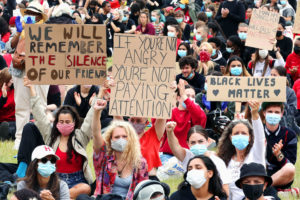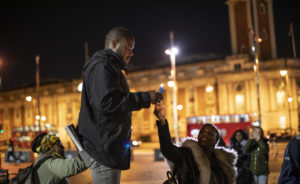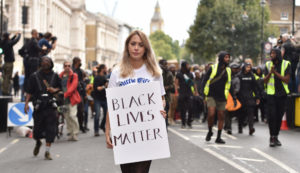Growing up the son of a Nigerian father and Polish mother in Lagos, I often wondered what the real root of racial inequality was. Watching movies about the US civil rights movement with my father it was clear to me why whites were able to treat blacks so badly in America: they outnumbered them and so could dominate them. I had more difficulty understanding why Europeans had been able to colonise Africa without that advantage. My dad said it was because the Europeans had better weapons. And the British, in particular, were a very crafty people, who had deployed all sorts of trickery to bamboozle Africans. While this made a certain sense, I still wondered why Africans hadn’t then manufactured better weapons, and decided to be craftier.
I knew that the will to dominate did not exist only in whites: I saw Nigerians lording it over other Nigerians. So I understood why racial domination was practised — but not what made it possible. Or why, despite the grim facts of history, Africans (and the world in general) accorded white people more status than others.
For going on five centuries now, we’ve been living in a world that generally positions whites at the top, blacks at the bottom, and others somewhere in between. The story about how such an order came about is familiar, incorporating the transatlantic slave trade, colonialism and white supremacist ideas. But what is sustaining this order today, despite consensus that racial hierarchies are morally unacceptable? Any behavioural pattern that persists while being at odds with popular opinion must be driven by something very powerful indeed.
I believe that the chief shaper of racial group dynamics today is money. And it’s a case I make in my book It’s Not About Whiteness, It’s About Wealth. It is not the only thing that matters but it is the thing that matters most in a capitalist world. Thomas Piketty has traced how the distribution of wealth determines the distribution of power. It is not merely about the raw purchasing power of money; it is also about the meaning people attach to wealth and the qualities they attribute to those who have it and those who don’t. Money, and our understanding of it, shapes racial group dynamics in everything from immigration, technology and media to stereotypes, prestige and geopolitics.
Single European states, including Britain and Germany, have larger economies than the entire continent of Africa, home to 1.4 billion people and roughly 90% of the world’s black population. And even the most diverse European countries still have large white majorities — Britain’s, for instance, is 82% — meaning there is a strong correlation between national and racial wealth. Sweden, a country of 10 million people, generates a larger GDP than Nigeria, the largest black nation, with over 200 million inhabitants. Tiny Ireland, with its five million citizens, has a GDP of $520 billion, compared with the $411 billion of South Africa, the most industrialised black-majority nation, which has a population of 60 million.
The economic gulf is not just between black and white-majority countries, of course. Norway’s five-million-strong economy boasts a GDP of $505 billion, compared with the $461 billion of Bangladesh, home to 170 million people.
Meanwhile, the “best” passports are those from rich nations, irrespective of their nationals’ skin colour. In 2022, for instance, a United Arab Emirates passport was ranked the most powerful in the world, enabling you visa-free or visa-on-arrival travel to 176 countries. However, as most rich nations are white-majority, we live in a world in which white people get to gate-keep the world’s best living situations, but can usually travel wherever they want at the drop of a hat. You can travel to 173 countries hassle-free if you have a German, French or South Korean passport, and 171 if you have a British or Japanese one. But if you hold a Nigerian passport, you must get a visa to travel to 145 countries; if you hold a Pakistani passport, you need one to enter 154 countries.
The correlation between race and wealth is also why Western academia, the world that I inhabit, dominates global academia. Harvard University has more in its endowment fund than the Nigerian state has in foreign reserves. The total education budget of Nigeria in 2021 amounted to the equivalent of £1.2 billion; the wealthiest British universities, such as Oxford and Cambridge, have annual budgets exceeding £2 billion. This cash funds world-class research and attracts the very best scholarly talent: how are poorer universities supposed to compete?
Because of their credibility and prestige, Western universities attract most of the over five million students who study abroad each year. There are over 600,000 foreign students in Britain — the most popular destination after America for international study — who usually pay at least £20,000 per year in tuition fees alone. This makes UK universities ever wealthier, ever more capable of financing world-class research and ever more attractive to global scholarly talent. It is hardly surprising, then, that Western academia is at the heart of global knowledge production today. “Decolonising” the curriculum by adding some more black and brown authors to reading lists won’t change that. In fact, it might just attract even more foreign students to the UK, and entrench the domination of Western academia. How does that further racial equality?
Wealth brings entire countries prestige, not just universities. It means whites and successful East Asians (such as the Japanese) are often stereotyped as competent, while black and brown people, associated with unsuccessful nations, are stereotyped as less competent. Wealth gives mid-sized European nations more influence in the corridors of international institutions like the UN than black or brown nations with several times their population. It is why the Western media has global influence, while the media of black-majority nations crosses few borders.
The racial order is an international order. But the UK race debate is that it tends to ignore this reality in favour of a parochial Anglo-American lens, which arrogantly assumes the race issue can be resolved in Britain and America — where only 3% of the world’s black population resides. A proportion that will only shrink as Africa’s population is set to double to 2.5 billion by 2050. Demographic realities mean it is global-scale dynamics that will shape the future of race relations, not their manifestations in particular Western societies.
I am hardly the first person to realise that money matters. Many Brits would readily acknowledge this, but most Westerners of all skin colours do not grasp just how important wealth is when it comes to racial inequality because of their attitude to money. Western nations are affluent societies with generous welfare systems; people can afford to be less aspirational. A 2021 survey of Americans, Brits, Germans, Swedes, Italians, Spaniards and the French showed an average 28% of people in these nations consider it “important” for them personally to become rich. Brits placed the lowest value on wealth with only 19% saying it was important to them. Contrary to pop-culture portrayals of Americans as uber-materialists, only 30% prioritise wealth.
The same survey conducted among the Japanese, Chinese, South Koreans and Vietnamese showed an average of 58% consider it important to become rich, making them twice as likely as Westerners to prioritise money. Even the Asian nations that have been wealthy for decades now are more money-focused than Westerners — in Japan, 43% say it is important for them to become rich, while in Vietnam, the figure is an enormous 76% — and the same pattern is evident in Africa, the Middle East and South America. The status hierarchies people establish in their heads are built around the dimensions they consider most important to their everyday lives. Most people around the world consider wealth to be the most relevant indicator of status. And the race conflict today is, at heart, a conflict over group status.
Too many on the Right today deny the persistence of a racial hierarchy. Too many on the Left believe it can be lectured out of existence. But debating the details of colonialism, slavery and Western imperialism won’t change the status quo and its consequences for the everyday lives of people of colour. Not if money remains on the margins of the race debate.
Disclaimer
Some of the posts we share are controversial and we do not necessarily agree with them in the whole extend. Sometimes we agree with the content or part of it but we do not agree with the narration or language. Nevertheless we find them somehow interesting, valuable and/or informative or we share them, because we strongly believe in freedom of speech, free press and journalism. We strongly encourage you to have a critical approach to all the content, do your own research and analysis to build your own opinion.
We would be glad to have your feedback.
Source: UnHerd Read the original article here: https://unherd.com/





